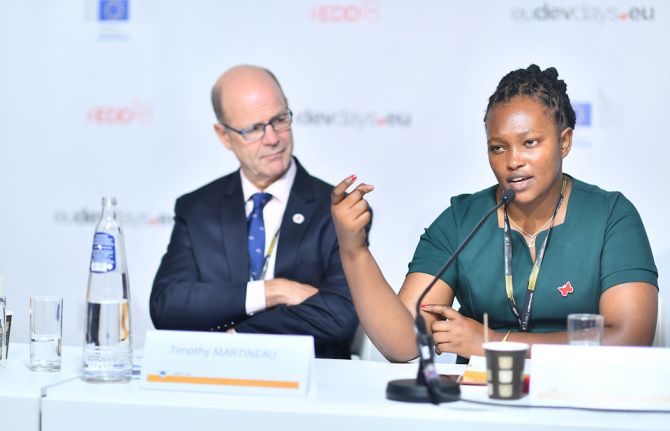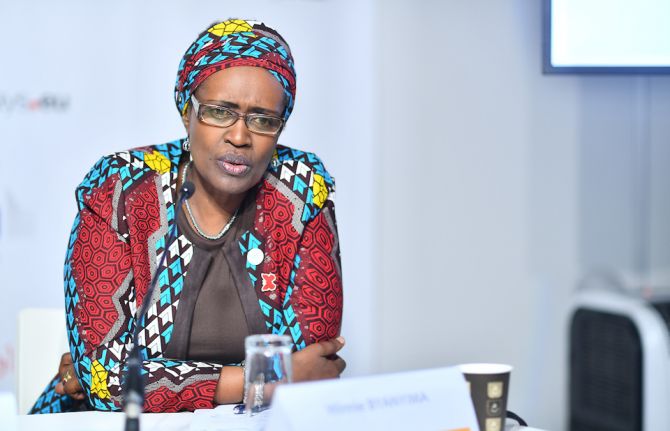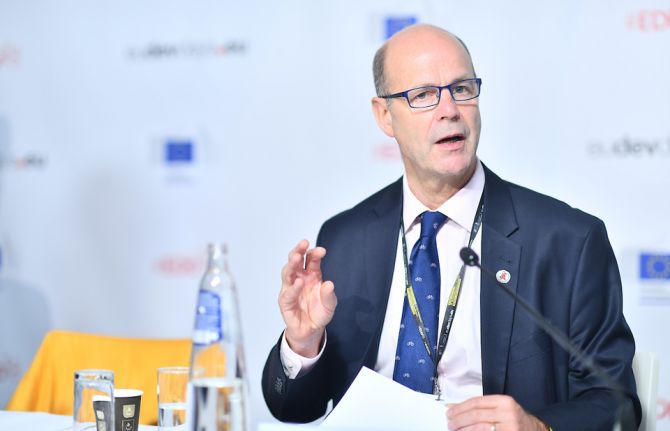



Feature Story
Young women and girls need a seat at the table to stop new HIV infections
07 June 2018
07 June 2018 07 June 2018Lucy Wanjiku is a young mother living with HIV and team leader of Positive Young Women Voices from Kenya. She was just 19 years old when she found out that she was living with HIV, a devastating shock for her. “It was one thing to become an adolescent mother and another to be HIV-positive,” said Lucy. “I was discriminated against by the community, my family and even at the health facility. There is no real support structure available.”
Ms Wanjiku’s story is a familiar one in sub-Saharan Africa. Around 6900 adolescent girls and young women between the ages of 15 and 24 years become newly infected with HIV every week—5500 of whom live in sub-Saharan Africa.
Ms Wanjiku is now using her voice to help others and raise awareness around the challenges that young women face in Kenya on a daily basis. At an event organized by UNAIDS at the European Union Development Days (EDD) forum in Brussels, Belgium, Ms Wanjiku gave the audience an alarming insight into issues around gender-based violence, early marriage, intimate partner violence, transactional sex, low school attendance rates and lack of economic empowerment, which are all key risk factors for HIV that young women and girls face every day.
“Support groups work,” said Ms Wanjiku. “Community-based organizations can facilitate this smoothly when supported. We need to engage more adolescent girls and young women leaders at the decision-making tables to tailor what works for us so that it’s sustainable.”
The event, entitled Empowering Women and Girls—Reducing New HIV Infections, highlighted the importance of empowering young women and girls to stop new HIV infections. Held on 5 and 6 June, the EDD forum was attended by more than 6000 people from 140 countries, representing 1200 organizations from the development community.
“Considerable efforts need to be taken to reach the Fast-Track Target of reducing the number of new HIV infections among adolescent girls and young women to below 100 000 per year by 2020,” said Tim Martineau, UNAIDS Deputy Executive Director, Programme, a.i. “The HIV Prevention 2020 Road Map, launched by UNAIDS, the United Nations Population Fund and partners in 2017, will be critical to guiding efforts and I cannot stress enough the importance of also engaging men and boys for long-lasting change.”
The event was moderated by Ebony Johnson, a public health and gender strategist, and brought together a wealth of expertise and experience from youth activists, people living with HIV, civil society and international development representatives.
Highlighting the importance of access to information, Melodi Tamarzians, a youth ambassador on sexual and reproductive health and rights from the Netherlands, highlighted that only 34% of young people have accurate knowledge about HIV prevention and transmission. “I believe in the infinite power of young people to make a change for themselves and their communities,” she said. “And they need access to comprehensive sexuality education, which is not only a key for preventing violence but has far-reaching individual and societal benefits.”
Winnie Byanyima, the Executive Director of Oxfam International, addressed policy barriers and reminded the audience that in order to enhance agency among young women and girls, there needs to be space for young people, especially women and girls, to take part in decision-making processes. She added that investment needs to be secure in order to strengthen economic empowerment to enhance women’s health. “Young women affected by HIV can be afraid of accessing health care because of a lack of confidentiality, discrimination and cost. We need to invest in peer education and free access to health care to empower women to protect their health,” she said.
UNAIDS, together with a wide range of partners, including women living with HIV and women’s organizations, works towards meeting the needs of girls and women across all targets in the 2016 United Nations Political Declaration on Ending AIDS. UNAIDS works towards ensuring that women and girls everywhere have their rights fulfilled and are empowered to protect themselves against HIV and that all women and girls living with HIV have immediate access to treatment and care.



